
It will be difficult to tell from this review, another review, or any number of other reviews combined, whether you will like The Novelist or not. If you're a fan of similar games like Depression Quest or Gone Home, there's no guarantee you will like this game. If you usually spend your time with AAA, action-packed titles, there's no guarantee that you won't like this game. It's a tricky beast.
The tone of the game, as you can probably tell, is sombre. Even the house that the family live in has its own sad story; the ghost you play as has its own back story, revealed through diaries and letters that curiously only appear at night. Your aim, as the ghost, is to read the thoughts of each family member, search for clues around the house, and then decide which of the Kaplans gets exactly what they want in each chapter. If you find enough information about what everybody wants (it's pretty easy; there are a set number of clues and memories to find in each chapter, and the game straight up tells you when you're missing something), then you can make a compromise with a second person. The third person gets nothing, apart from a hefty dose of disappointment. The choices you make in each chapter affect the relationships between the Kaplans. What you really want, by the end of the game, is to make them all happy, but life being what it is not everyone gets what they want all the time.
In the regular, more gamey mode, there's a mild stealth mechanic which forces you to avoid the family as much as possible, as being spotted will run the risk of removing that character's outcome or compromise for that chapter, and then you've got two miserable Kaplans mooching around. The game's ghost has ethereal power over lamps; both travelling between them, and making the lights flicker in order to entice a family member from one room to another. It's basic stuff, and not too challenging. Your main aim is to pick up the narrative threads and weave them together, not nervously hide in a corner as Dan or Linda stand nearby, suspicious of your presence. It's no Metal Gear Ghost.
In regular story mode, the stealth mechanic is stripped out and you can straight up walk around as much as you want. You have no interaction with the family outside of reading their thoughts and memories, and whispering your choice and compromise to Dan at the end of each day. It's a purer experience and rather less fiddly; if you can't reach that lamp and can't be bothered to navigate a circuit to get to it, you can just drop to the floor. Be warned, though: the game's ghost does not have the ethereal power of walking quickly. This is Caspar the Dawdling Ghost.
However you choose to traverse the house, the mechanics of learning about the Kaplans are the same in every single chapter. You read letters, notes, and diaries, look at Tommy's pictures, and view memories that usually consist of two-line conversations. It's not hugely engaging. Gone Home made an extremely strong case for epistolary games; whilst the majority of the gameplay involved reading endless letters and diaries and far too revealing notes scattered in deeply inappropriate places, the personalities of each character came through on the page. The Novelist doesn't have the same snap to its writing. It lacks subtlety. Linda spells out all her marital woes and fears for her lack of career in a very obvious way, and in some cases, signs off her letters to her friend with the equivalent of 'LOL shouldn’t have said that'. Tommy's drawings are a particular offender for their brazenness. Whilst it can partially be explained by his relative youth, every single picture he draws communicates his feelings in a very obvious way (picked an outcome he likes in the previous chapter? Cartoon Dan and Tommy all smiley and happy. Picked an outcome he didn't like? Cartoon Dan and Tommy all sad). There's no need to read between the lines here, which will appeal to many players. For others, the game will feel rather prescribed.
The written summaries of each chapter and its outcome are unrelentingly harsh in their delivery, but these benefit from their directness. Yeah, you made that choice, and boy you're gonna feel exactly how bad Tommy does because you didn't fix his pedal car. You jackass. It works less well at the end of the game, because all your going backwards-and-forwards and begrudgingly letting someone down moments are summed up into 3-4 neat paragraphs. Reading 'you have a horrible loveless marriage that is going through the motions but its not so awful that you get a divorce and hey, by the way, you both cheat' is abrupt after four hours of being in these people's lives.
The themes that The Novelist raises are weighty. Trying to achieve a balance between work and family and dreams (however realistic they may be) is a universal human experience, and the game does a good job of portraying the complexity of achieving that balance. It's arguable as to whether or not the mechanics can match up to such lofty ambition, but The Novelist serves up a healthy portion of food for thought. Each character's preference is clearly signposted so there's little room for any kind of interpretation (the game outright tells you what each character wants in sentence fragments) as to their motives, and the game's premise struggles with having three people living in a house who clearly aren't communicating well. Their interactions are extremely limited and the voice acting is at times rather wooden. Dan, Linda, and Tommy don't necessarily feel like a family, more like three people in the same space, kind of forced to put up with each other. Very few end-of-chapter conclusions allow all three characters to reach some level of happiness, which lends everything an artificial air; why don't these people just sit down and talk occasionally? It's particularly grating in one chapter, when one character begins to indulge in rather self-destructive behaviour. It rather comes out of nowhere, and the Kaplans spend so much time writing to friends and drawing pictures about it that the chapter is rather more frustrating than sympathetic.
On a less philosophical level, the visuals have a pleasingly painterly feel to them. The character models are stylized, but are devoid of facial expressions; combined with their clunky dialogue, the Kaplans do feel a bit robotic. The house the Kaplans live in starts out very bare, but gradually fills up with trinkets from the choices you make, which is a really nice touch. The game would benefit a great deal from a few more of those small touches, as each chapter has a tendency to feel a little rote. The notes and diaries and letters are all found in similar places every time, and you'll develop a circuit that helps you hit every usual 'hiding' spot in the house. Like the characters, the role of the ghost feels a little robotic too.
Your opinion of The Novelist will depend very heavily on your reaction to the concerns of its characters. Dan or Linda's woes are common amongst people, and their struggles to balance what they want against what they have will speak to many players. The thought-provoking nature of the game will elevate it above the problems with its mechanics. For others, the execution of heady themes will be too underwhelming, too direct, and the pay-off won't be worth the hours invested. Most people will agree that The Novelist has tried something different, has attempted something that games don't usually touch, which is something worth a little of everybody's attention.

 RSS Feed
RSS Feed
